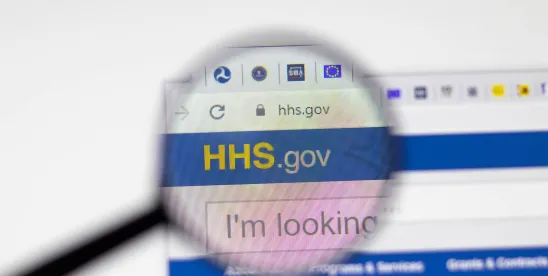On July 31, 2025, the Department of Health and Human Services (HHS) announced a much-anticipated 340B Rebate Model Pilot Program (Pilot Program) via guidance (Guidance) that will be formally published on August 1, 2025. The Pilot Program and accompanying Guidance appear intended to respond to ongoing litigation regarding 340B rebate models brought by pharmaceutical manufacturers.
Below is an outline of the underlying manufacturer litigation as background, as well as the key provisions in the Guidance concerning the Pilot Program, which provides an HHS-approved mechanism for manufacturers to establish a 340B rebate program.
Background: Ongoing Litigation Regarding the 340B Rebate Model
As noted above, the Pilot Program appears to be a conciliatory policy proposal issued in connection with ongoing litigation regarding 340B rebate models proposed by pharmaceutical manufacturers. The litigation stems from manufacturers’ claims alleging that the Health Resources and Services Administration (HRSA), the government agency that administers the 340B program, unlawfully rejected the manufacturers’ proposed rebate models in violation of the 340B statute.
Under the current model, 340B covered entities, including eligible hospitals, may purchase 340B covered outpatient drugs at an up-front discounted rate from drug manufacturers. Under manufacturer-proposed “rebate models,” 340B covered entities would be required to purchase drugs at commercial prices and then seek a rebate for the price differential between the commercial price and the 340B ceiling price. In order to obtain the rebate, manufacturers sought to require that covered entities (such as hospitals) submit claims data concerning the quantity and dispensation of the purchased drugs to a third-party vendor for the manufacturer to verify and approve the claim for 340B discounted pricing and issue the rebate. On September 17, 2024, and December 13, 2024, HRSA issued letters notifying certain manufacturers that they would need to obtain approval prior to instituting the rebate models because the language of the 340B statute states: “‘[t]he Secretary shall enter into an agreement with each manufacturer of covered outpatient drugs under which the amount required to be paid (taking into account any rebate or discount, as provided by the secretary) to the manufacturer’ shall not exceed the statutory ceiling price.” On May 15, 2025, the U.S. District Court for the District of Columbia decided that, in accordance with the 340B statute, HHS must approve the use of 340B rebate models prior to their implementation. Certain pharmaceutical manufacturers have since appealed this decision.
HHS Approves a Rebate Model
The HHS Guidance formally introduces the 340B Rebate Model Pilot Program, which provides an HHS-approved avenue, on a temporary basis and subject to the program requirements, for manufacturers to implement rebate models compliantly under the 340B program, and for HHS to “test the rebate model on a select group of drugs.” Specifically, the Pilot Program will be limited to drugs with National Drug Code (NDC) 11s on the Medicare Drug Priced Negotiation Selected Drug List, will have a term of at least one year, and will only be available for approved manufacturers who volunteer for the program.
Manufacturers with Medicare Drug Price Negotiation Program (MDPNP) Agreements for price applicability year 2026 can submit applications (in the form of Pilot Program plans) by September 15, 2025, and will receive an approval decision by October 15, 2025, with the Pilot Program starting January 1, 2026. Manufacturer plans must be under 1,000 words and must meet specific criteria set forth in the Guidance, including, without limitation, the following:
- General Requirements
- Manufacturers should cover all data submission costs associated with Information Technology (IT) platforms and no costs can be passed on to covered entities.
- Covered entities should receive 60 days’ notice prior to implementing a rebate model.
- Covered entities should be allowed to purchase the selected drugs through their existing infrastructure (e.g., 340B wholesaler accounts).
- Manufacturers should provide technical assistance/customer service in good faith regarding questions.
- Manufacturers should ensure secure data handling on its IT platform in accordance with HIPAA and other applicable privacy/data security laws.
- Reporting Requirements
- Covered entities should get 45 days from the date of dispensing to submit claims data, with allowances for exceptions or extenuating circumstances.
- IT platforms should filter the data received from covered entities to use only data needed to effectuate the rebate and provide real-time reconciliation reports for covered entities to track the status of their claims.
- Manufacturers should submit periodic reports to HRSA including information on claims delays and denials.
- Rebate Requirements
- Manufacturers should specify if rebates are paid at the package or unit level and rebates should be paid (or denied with documentation) within 10 days of data submission.
- Manufacturers should ensure that rebates are not denied due to concerns of diversion or Medicaid duplicate discounts as those issues should be addressed through audits and/or the statutory administrative dispute resolution (ADR) process, and any denials include the reasons.
- Manufacturers should ensure that rebates are paid only for drugs listed under the MDPNP, regardless of payer.
- Data
- Data requested as part of the plan should be limited to: i) date of service and prescription; ii) RX and fill numbers; iii) 11-digit NDC; iv) quantity and provider information; v) 340B ID; and vi) RX bank identification and processor control numbers.
Additionally, the government seeks public comment on the following questions concerning the Pilot Program:
- Are there additional safeguards for covered entities or flexibilities for manufacturers that should be considered in designing the pilot program?
- Are there additional data and reporting elements that should be used to improve evaluation and implementation of the pilot program?
- Are there any implementation issues such as administrative or logistical issues that have not been addressed in the pilot program?
The Pilot Program appears to be a potential first step in modifying the 340B program from an upfront discount program to a rebate model, depending upon how the pilot operates. Covered entities should review the eligibility and reporting criteria under the Pilot Program thoroughly and consider which additional safeguards could mitigate adverse impacts and logistical reporting issues resulting from a shift to a 340B rebate model. Covered entities may also want to consider submitting comments to HHS regarding the Guidance.



 />i
/>i

